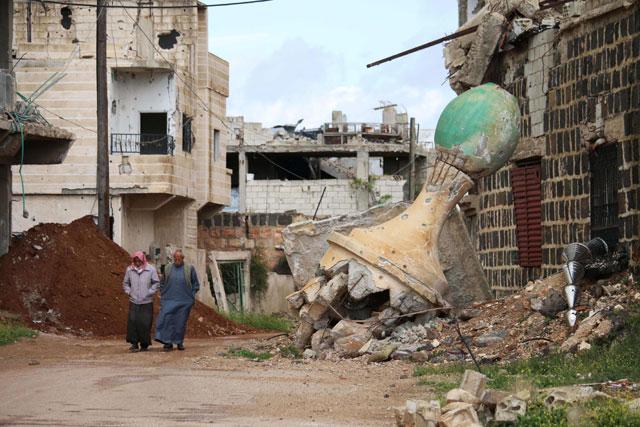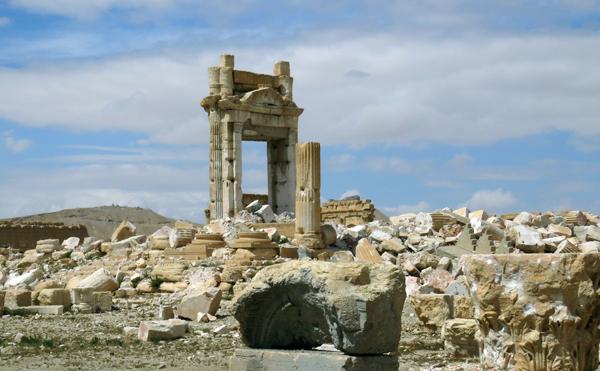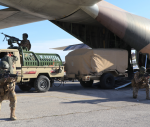You are here
Syria troops press advance after blow to Daesh in Palmyra
By AFP - Mar 28,2016 - Last updated at Mar 28,2016

Elderly Syrian men walk past a damaged mosque in a rebel-held area of Daraa, in southern Syria, on Monday (AFP photo)
DAMASCUS — Syrian forces strengthened their hold on Palmyra on Monday and pushed forward against the Daesh terror group after dealing it a major blow by retaking the ancient city.
The country's antiquities chief said the treasured monuments damaged by the extremists could be restored in five years, but a UN expert cast doubt on the estimate.
Backed by Russia, pro-government fighters overran Palmyra on Sunday morning in a victory President Bashar Assad hailed as "fresh proof of the efficiency of the Syrian army and its allies in fighting terrorism".
The United States welcomed the news, despite concerns over Assad's brutal record.
"We do think that it's a good thing that Daesh no longer controls it," State Department spokesman John Kirby said.
"That said, we're also mindful, of course, that the best hope for Syria and the Syrian people is not an expansion of Bashar Assad's ability to tyrannise the Syrian people."
On Monday, regime forces turned to nearby Daesh-held towns.
"The army was concentrated around Al Qaryatain, and today the military operations began there," said a military source in Palmyra.
"That is the next goal for the Syrian army. They also have their eyes on Sukhnah" towards the northeast.
The Syrian Observatory for Human Rights said Sukhnah’s capture would bring government forces to the gates of oil-rich Deir Ezzor province, a Daesh bastion.
Daesh overran Palmyra — a UNESCO world heritage site known as the “Pearl of the Desert” — in May 2015 and used its ancient theatre for public killings as the world watched in horror.
The extremist group blew up temples and tower tombs, as part of its campaign against pre-Islamic monuments it considers blasphemous.
An AFP correspondent in Palmyra saw the Temple of Bel and the Arch of Triumph in pieces on Sunday, with some large stones marred by spray-painted messages in support of Daesh.
‘Five years’ to restore
On Monday, army sappers worked to defuse bombs and mines Daesh had planted before retreating.
One soldier said more than 50 bombs had been disarmed.
Antiquities chief Maamoun Abdulkarim said with UNESCO support, his department would need five years to restore the destroyed monuments, and that a preliminary assessment showed 80 per cent of the site was “in good shape”.
But UN expert Annie Sartre-Fauriat said she was “very doubtful” a speedy restoration would be possible.
The US-based Soufan Group said Daesh “suffered an
undeniable loss”.
The extremist organisation has come under growing pressure from Syrian and Iraqi forces set on breaking apart its self-proclaimed “caliphate”.
It has been responsible for a spate of deadly attacks abroad, most recently in Brussels, where 35 people were killed last week.
“The past week exemplifies the future of the Islamic State [Daesh]: relentless internal setbacks amid persistent external attacks,” said the Soufan Group.
Syria expert Thomas Pierret said the loss of Palmyra showed Daesh was “clearly weaker than in the past”.
But he said he expected the group to “fight much harder” to maintain control of its de facto capital of Raqqa and Deir Ezzor to the east.
“After all, Palmyra was a forward post.”
Russia, Iran hail victory
Long keen to portray his army as the vanguard of the fight against the extremists, Assad hailed Sunday’s victory in Palmyra as an “important achievement”.
Russian President Vladimir Putin, whose government provided air and ground support for the offensive, congratulated Damascus.
Experts say Russia’s role in Palmyra has left the West scrambling to figure out Putin’s game plan.
“All the talk in the West that Russia was going to ditch Assad was nonsense,” said Pavel Felgengauer, a Russian military analyst.
“We are not planning to abandon him now. Russia wants Assad to stay in power and the goal is to give him a chance to win the civil war.”
Assad’s other key ally, Iran, has hailed the victory and pledged its continued financial and military assistance.
Hadi Al Bahra of the opposition National Coalition said if the regime had been serious, it would have stopped Daesh from taking Palmyra to begin with.
“From the start, the regime’s strategy was to allow the threat posed by Daesh to grow, in order to tell the West that either Daesh or Assad would prevail.”
In Palmyra, a government fighter said troops would aim to “find out what happened to the families that were in Palmyra... We’re afraid they’ve been kidnapped.”
Some 15,000 of the 70,000 residents had stayed on under Daesh rule in Palmyra, where most apartment blocks bore marks of the fighting and several had completely collapsed.
Related Articles
PALMYRA, Syria — Syrian troops recaptured the ancient city of Palmyra from the Daesh terror group on Sunday and pledged to build on the win
BEIRUT — The Daesh group has executed at least 217 people, including civilians, in and around the ancient Syrian city of Palmyra in the last
BEIRUT — The recapture of Palmyra in central Syria from Daesh militants puts government forces at the heart of the fight against the e

















